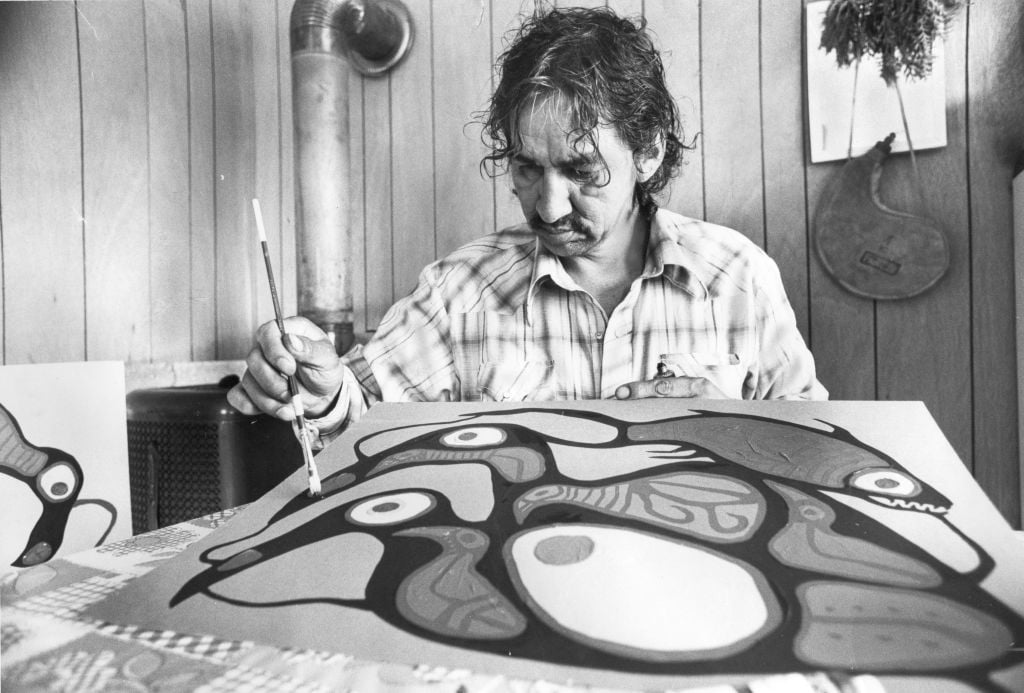
Eight people in Ontario, Canada have been arrested in connection to an art forgery ring responsible for producing and selling paintings falsely attributed to the late Indigenous artist Norval Morrisseau.
The suspects now face 40 total charges related to forgery, fraud, and criminal organization, according to information shared by the Ontario Provincial Police (OPP) last week.
The arrests, made on March 1, mark the culmination of a multi-year investigation into the elaborate forgery scheme—the full story of which also includes forced child labor, murder, and a member of the Barenaked Ladies.
A fake Norval Morrisseau artwork seized by police as part of a multi-year investigation into an Ontario forgery ring. Courtesy of the OPP.
Considered by many to be the grandfather of contemporary Indigenous art in Canada, Morrisseau—or Copper Thunderbird, as he was sometimes known—was a member of the Bingwi Neyaashi Anishinaabek First Nation who fused Indigenous lore, mystical symbols, and political messages into his vibrantly colorful work. When he died in December 2007, Morrisseau left behind a rich and seemingly abundant body of work—though how much of that work is authentic remains somewhat of a mystery
The probe into fake works by the artist began in 2019, when Detective Sargent Jason Rybak of the Thunder Bay Police Service (TBPS) in northwestern Ontario was researching the death of a man named Scott Dove.
“During that, [Dove’s] mom called me and asked if I had seen this documentary called There Are No Fakes, which had information on the murder of her son,” Rybak recalled in an interview last week with CBC/Radio-Canada.
Released earlier that year, the documentary begins with Kevin Hearn, keyboardist and guitarist for Barenaked Ladies, who had filed a complaint against a Toronto-based gallery alleging that a Morrisseau painting he had purchased there was a fake.
Hearn’s lawsuit had, at the time, been dismissed by a local court, but the film found evidence of a forgery ring that likely produced the artwork he owned, and suggested that they may have even been created by underage forgers in sweatshop-like conditions. (In September 2019, the ruling in Hearn’s case was overturned by the Ontario Court of Appeal and the rockstar was awarded $60,000 in compensation.)
After watching There Are No Fakes, Rybak reached out to Hearn. “That really was the jump-off point for this investigation,” the detective said.
Not long after, TBPS officers obtained a warrant to search the home of Gary Lamont. There, police “started seizing painting after painting after painting,” Rybak explained. “We quickly realized the magnitude of what we were getting ourselves into.” It was at that point that the team behind the investigation called the OPP for help.
A suspected Morrisseau forgery seized by police. Courtesy of the OPP.
Lamont is one of the eight suspects charged last week. The others are David John Voss, Diane Marie Champagne, Linda Joy Tkachyk, Jeffrey Gordon Cowan, James White, David P. Bremnerand, and Benjamin Paul Morrisseau—a nephew of the late artist.
Together, the suspects represent three different, yet connected groups of Morrisseau forgers. The first was launched back in 1996, while the others were established in 2002 and 2008, respectively. At times, all three rings collaborated.
Police believe Morrisseau made for a lucrative target both because he was an important artist and a prolific one.
The forgers “knew his lifestyle,” Rybak said. “They knew that he had struggles. They knew that he never kept a list of his paintings… At times [Morrisseau] would just give paintings away to people for milk and and eggs, and so they knew that there was no way in their mind of tracking legitimate paintings.”
To determine which paintings were fake, the investigative team took a “multifaceted approach,” according to OPP detective inspector Kevin Veillieux.
“We conducted a wide range of witness interviews that provided very valuable information,” Veillieux told CBC. “We had reached out to different groups that had the ability to do certain forensic testing for us.”
In total, investigators seized more than 1,000 fake Morrisseau artworks from a variety of sources, including collectors, galleries, and museums. Some were purchased for “tens of thousands of dollars,” according to police.
And there are likely many more Morrisseau forgeries still out there. Some even suggest there might be 10 times as many fakes as there are genuine Morrisseau artworks on the market. Veillieux encouraged owners of other suspected imitations to seek legal counsel before going to the police.
More Trending Stories: